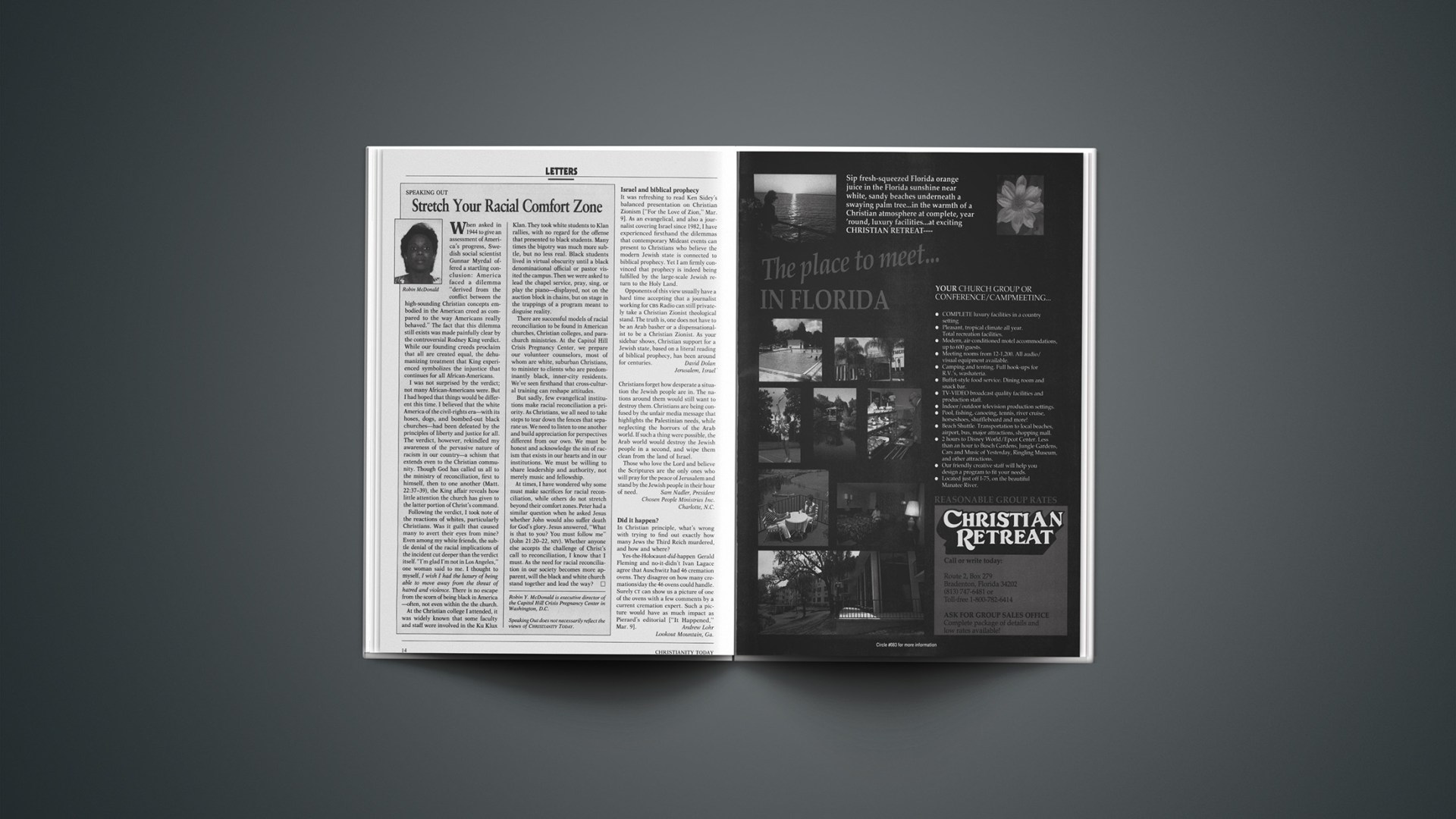When asked in 1944 to give an assessment of America’s progress, Swedish social scientist Gunnar Myrdal offered a startling conclusion: America faced a dilemma “derived from the conflict between the high-sounding Christian concepts embodied in the American creed as compared to the way Americans really behaved.” The fact that this dilemma still exists was made painfully clear by the controversial Rodney King verdict. While our founding creeds proclaim that all are created equal, the dehumanizing treatment that King experienced symbolizes the injustice that continues for all African-Americans.
I was not surprised by the verdict; not many African-Americans were. But I had hoped that things would be different this time. I believed that the white America of the civil-rights era—with its hoses, dogs, and bombed-out black churches—had been defeated by the principles of liberty and justice for all. The verdict, however, rekindled my awareness of the pervasive nature of racism in our country—a schism that extends even to the Christian community. Though God has called us all to the ministry of reconciliation, first to himself, then to one another (Matt. 22:37–39), the King affair reveals how little attention the church has given to the latter portion of Christ’s command.
Following the verdict, I took note of the reactions of whites, particularly Christians. Was it guilt that caused many to avert their eyes from mine? Even among my white friends, the subtle denial of the racial implications of the incident cut deeper than the verdict itself. “I’m glad I’m not in Los Angeles,” one woman said to me. I thought to myself, I wish I had the luxury of being able to move away from the threat of hatred and violence. There is no escape from the scorn of being black in America—often, not even within the the church.
At the Christian college I attended, it was widely known that some faculty and staff were involved in the Ku Klux Klan. They took white students to Klan rallies, with no regard for the offense that presented to black students. Many times the bigotry was much more subtle, but no less real. Black students lived in virtual obscurity until a black denominational official or pastor visited the campus. Then we were asked to lead the chapel service, pray, sing, or play the piano—displayed, not on the auction block in chains, but on stage in the trappings of a program meant to disguise reality.
There are successful models of racial reconciliation to be found in American churches, Christian colleges, and parachurch ministries. At the Capitol Hill Crisis Pregnancy Center, we prepare our volunteer counselors, most of whom are white, suburban Christians, to minister to clients who are predominantly black, inner-city residents. We’ve seen firsthand that cross-cultural training can reshape attitudes.
But sadly, few evangelical institutions make racial reconciliation a priority. As Christians, we all need to take steps to tear down the fences that separate us. We need to listen to one another and build appreciation for perspectives different from our own. We must be honest and acknowledge the sin of racism that exists in our hearts and in our institutions. We must be willing to share leadership and authority, not merely music and fellowship.
At times, I have wondered why some must make sacrifices for racial reconciliation, while others do not stretch beyond their comfort zones. Peter had a similar question when he asked Jesus whether John would also suffer death for God’s glory. Jesus answered, “What is that to you? You must follow me” (John 21:20–22, NIV). Whether anyone else accepts the challenge of Christ’s call to reconciliation, I know that I must. As the need for racial reconciliation in our society becomes more apparent, will the black and white church stand together and lead the way?
Robin Y. McDonald is executive director of the Capitol Hill Crisis Pregnancy Center in Washington, D.C.
Speaking Out does not necessarily reflect the views of CHRISTIANITY TODAY.










